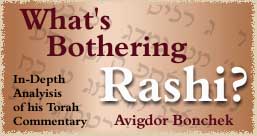

Back to this week's parsha | Previous Issues
Parashas Pinchas
Last week (Parashas Balak) we asked a question on the Torah and not on Rashi. . Ch. 22:18 Bilaam refuses to go with messengers of Balak and he says:
"If Balak will give me his house full of silver and gold I am not able to transgress the word of Hashem my G-d to do even a small thing or a big thing." Compare the two verses. Very similar, right? But not exactly. If Bilaam remembered so well what he had said originally, why did change the words "even a small thing or a big thing" to "good or evil" ? An ANSWER : Bilaam originally refused to curse the Israelites and he said "I am not able to transgress the word of Hashem my G-d to do even a small thing or a big thing." At that time he was uncertain whether G-d would allow him to make any kind of curse. But it never dawned on him that his curses would be turned into blessings. That possibility was so unlikely it never occurred to him. So all he could "assure" Balak was maybe I can do something (a small thing or a big thing) but maybe not even that. But after his debacle of not only not cursing the Israelites but even blessing them, Bilaam had to "cover his tracks." He repeated what he had said originally but with a slight (but significant) change in his words. Now he said: " I am not able to transgress the word of Hashem to do either GOOD or EVIL from my own heart." Because now he had done "evil" in the eyes of Balak, by blessing the Israelites. So he had to say "didn't I tell you so?!" But of course he hadn't told Balak that. A Subtle change that Bilaam figured Balak wouldn't notice. He didn't, but we did! Now to this week's sedra:
Numbers 25:11 RASHI Pinchas the son of Eleazar, the son of Aaron, the priest: RASHI: Because the tribes spoke disparagingly of him, saying "Have you seen the grandson of Puti, the father of whose mother (Putiel) used to fatten calves for idolatrous sacrifices and he has dared to kill a prince of one of Israel's tribes." Therefore the Scripture comes and shows his relationship to Aaron.
What Is Rashi Saying?
Questioning Rashi Next week, IY"H, we will suggest an answer.
Back to this week's parsha | Previous Issues
|